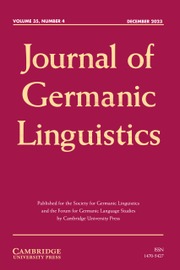Article contents
Inflection and the Paradigm in German Nouns
Published online by Cambridge University Press: 05 December 2008
Extract
The paper presents an analysis of noun inflection in Modern Standard German within a process framework. Familiar issues in the description of German inflectional morphology are discussed, such as analysis of weak nouns and of plural formation, and the establishment of inflectional classes, as well as broader theoretical issues such as postulation of identity relations (“zeros”). The elements of a process morphology are elaborated, including some that deviate from well-known models, such as recognition of a dynamic morphological component distinct from the static lexicon, expression of morphological semantics in the morphological component, and formalization of the notion of a paradigm. The paradigm is claimed to be an essential morphological structure, dynamic in nature, responsible for organization of the inflectional system and ensuring, in cooperation with operations applied to stems, correct sequencing and selection of these inflectional operations. It is also concluded that the inflectional class, derivative of the paradigm, may be a useful construct in some languages (including German), but is not a necessary one for all inflecting languages.
- Type
- Articles
- Information
- Copyright
- Copyright © Society for Germanic Linguistics 1996
References
REFERENCES
- 2
- Cited by


